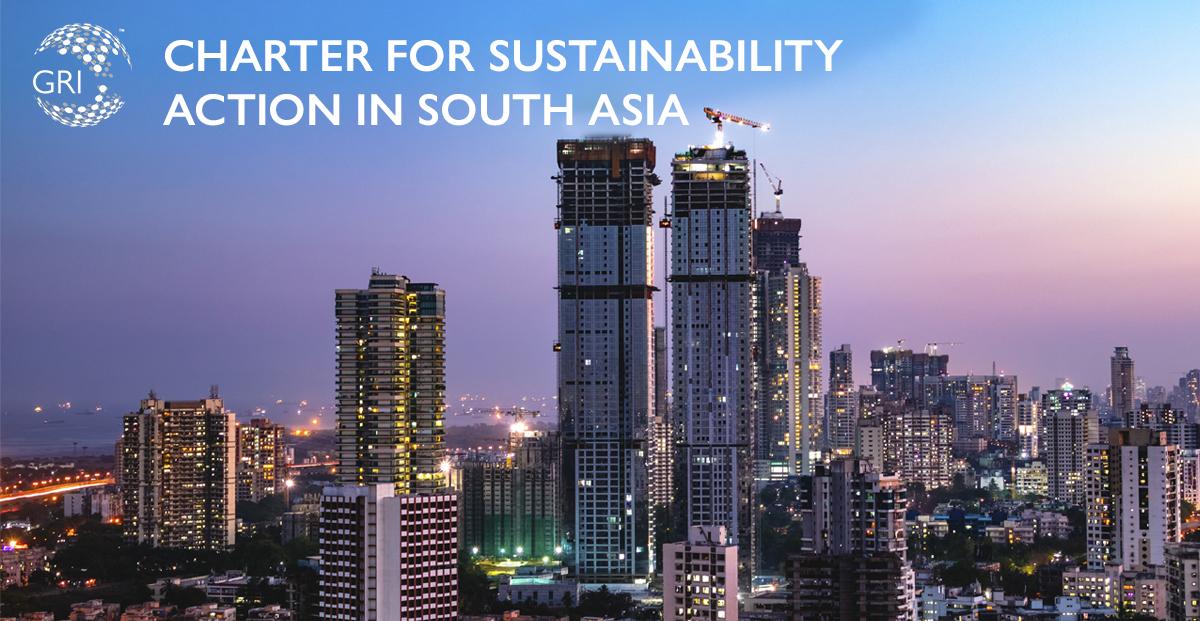Charter for Sustainability Action in South Asia
Milestone reached as organizations commit to support the SDGs

August 24, 2020 /3BL Media/ - Efforts across the South Asia region to raise ambition for sustainable development have been boosted following the agreement of a new sustainability charter.
The GRI South Asia Summit, held virtually during July, focussed on how the post COVID-19 rebuild could enable a sustainability transformation in the region, to alleviate growing economic, social and environmental pressures. As an outcome of the summit, a Charter on Sustainability Imperatives is being developed, which commits to a decade of urgent action in South Asia to ensure the completion of the Sustainable Development Goals (SDGs).
Organizations that sign up to the Charter agree to uphold three principles:
- Compliance: Adhere to all applicable national and sub-national laws and regulations wherever they operate.
- Ethics and governance: Act with the highest ethical standards and integrity, taking decisions and implementing actions in good faith.
- Transparency and disclosure: Make public their performance on economic, environmental and social dimensions.
Signatories will commit a series of actions, within two years, including:
- Publicly disclose their understanding of sustainability, either through a regularly published document or on an online platform.
- State the specific SDGs they identify as material, setting out how they relate to their business and are integrated in their strategies and plans.
- Commit to at least two new initiatives linked to the SDGs and showcase the impacts and business benefits that they lead to.
Aditi Haldar, Director of GRI’s South Asia Regional Hub, said:
“Attended by almost 1,500 people across the region and globally, GRI’s first-ever South Asia Summit was a catalyst for generating ideas on how to advance sustainable development and empower organizations to support the SDGs. What is important is that these contributions are not lost but lead to action.
Following the Summit, we have channelled the momentum generated into this Sustainability Charter, which commits organizations to increase their engagement in support of sustainable development. The Charter will encourage businesses to join our collective efforts to secure a fairer and more sustainable future for South Asia.”
Prof. Lakshman R Watawala, President of the Institute of Certified Management Accountants of Sri Lanka, said:
"The GRI South Asia Summit was timely in bringing to light sustainability imperatives which need urgent action and will be highlighted in the Charter, giving an action plan to both the government and the private sector."
Arup Chatterjee, Principal Financial Sector Specialist, Asian Development Bank, said:
“Using a range of common frameworks for the disclosure of environment, social and governance risks and the adoption of strategies to mitigate them, the South Asia Charter on Sustainability Imperatives will positively influence businesses and stakeholders for voluntarily committing to comply, monitor, and validate ESG performance standards.”
The GRI South Asia Charter on Sustainability Imperatives is in the process of being finalized and will publish soon. We would like to thank the core group members who contributed to developing the Charter:
- Anirban Ghosh, Chief Sustainability Officer, Mahindra & Mahindra Ltd
- Arvind Namdeo, General Manager, GAIL India Ltd
- Bharat Wakhlu, Founder and President, The Wakhlu Advisory
- Gauri Arora, Private Sector Specialist, United Nations India
- Lakshman R. Watawala, President, ICMA
- Linda Germanis, Private Sector Engagement Specialist, UNDP Bangladesh
- Prabodha Acharya, Chief Sustainability Officer, JSW Steel Ltd
- P. S. Narayan, Vice President, Head - Sustainability and Social Initiatives, Wipro Ltd
- Sanjib Bezbaroa, Executive VP Corporate EHS & Sustainability, ITC Ltd
The GRI South Asia Virtual Regional Summit took place 22-29 July, under the theme empowering decisions for a sustainable future, drawing on the context of the pandemic. The Summit had nine interactive sessions, with 53 speakers participating from 12 countries. It was attended by 1,466 people from 60 countries.
Events included the role of the SDGs in the economic reboot; how the transition to circularity can enhance competitiveness; promoting sustainable practices by SMEs; and addressing the challenges facing the textile sector. The Summit was representative of many sectors and groups, including business, policy, civil society and millennials (see here for a video contribution provided by NextGen in Bangladesh).
The Global Reporting Initiative (GRI) is the independent international organization that helps businesses, governments and other organizations understand and communicate their impacts. The GRI Standards are the world’s most widely used for sustainability reporting. GRI’s South Asia Hub, based in New Delhi, is one of eight locations globally.

